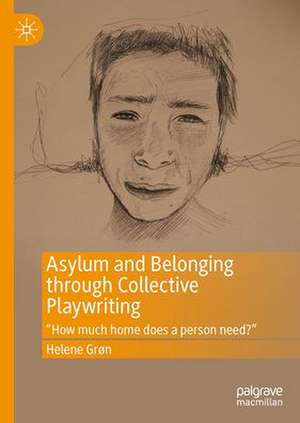Asylum and Belonging through Collective Playwriting: "How much home does a person need?"
Autor Helene Grønen Limba Engleză Hardback – 3 iun 2023
| Toate formatele și edițiile | Preț | Express |
|---|---|---|
| Paperback (1) | 682.49 lei 38-44 zile | |
| Springer International Publishing – 4 iun 2024 | 682.49 lei 38-44 zile | |
| Hardback (1) | 729.16 lei 6-8 săpt. | |
| Springer International Publishing – 3 iun 2023 | 729.16 lei 6-8 săpt. |
Preț: 729.16 lei
Preț vechi: 889.22 lei
-18% Nou
Puncte Express: 1094
Preț estimativ în valută:
139.54€ • 145.15$ • 115.20£
139.54€ • 145.15$ • 115.20£
Carte tipărită la comandă
Livrare economică 14-28 aprilie
Preluare comenzi: 021 569.72.76
Specificații
ISBN-13: 9783031248078
ISBN-10: 3031248074
Pagini: 256
Ilustrații: XIX, 256 p. 23 illus.
Dimensiuni: 148 x 210 mm
Greutate: 0.49 kg
Ediția:2023
Editura: Springer International Publishing
Colecția Palgrave Macmillan
Locul publicării:Cham, Switzerland
ISBN-10: 3031248074
Pagini: 256
Ilustrații: XIX, 256 p. 23 illus.
Dimensiuni: 148 x 210 mm
Greutate: 0.49 kg
Ediția:2023
Editura: Springer International Publishing
Colecția Palgrave Macmillan
Locul publicării:Cham, Switzerland
Cuprins
Chapter 1:Introduction: ‘How Much Home Does a Person Need?’.- Chapter 2: Ontologies of Belonging: Philosophical, Historical and Narratological Considerations.- Chapter 3: Dramaturgical Ethics: Undoing and Decreating.- Chapter 4: Ethnoplaywriting: Creating Belonging.- Chapter 5: Rebooting the Social Contract: Trampoline House and Deportation Centre Sjælsmark.- Chapter 6: Fieldwork Reflection: ‘Not just theatre, also politics, law’—Making Theatre in Deportation Centre Sjælsmark.- Chapter 7: ‘You are enough, you belong with us’: Reimagining Sisterhood as Collective Belonging.- Chapter 8: Fieldwork Reflection: The Sistas and Amazing Amelia.- Chapter 9: Conclusion: ‘Much Home’.
Notă biografică
Helene Grøn holds a PhD in Theatre Studies from the University of Glasgow and Glasgow Refugee, Asylum and Migration Network, and is currently a Postdoc at the University of Copenhagen, Denmark. She is also a writer and librettist, whose work has been performed and published. Helene's academic work has appeared in Research in Drama Education and Scottish Journal of Performance. She often combines research and politically engaged arts-practice around themes of refugees, asylum, migration and storytelling.
Textul de pe ultima copertă
“This book is an intellectual trampoline. It makes you bounce, turn somersaults, back flips and then drop to your knees. It’s the opposite of a rollercoaster. It helps you see above, beyond, behind and beneath. Serious exercise for mind, body and spirit, stretching concepts of home and belonging like elastic so show all the many powerful and extraordinary ways those who have to re-home themselves or make home with strangers open up new horizons for us all, giving us a glimpse of life over the fence.” – Alison Phipps, Professor of Languages and Intercultural Studies UNESCO Chair in Refugee Integration through Languages and the Arts, University of Glasgow
This book explores the notion of home in the wake of the so-called refugee crisis, and asks how home and belonging can be rethought through the act of creative practices and collective writing with refugees and asylum seekers. Where Giorgio Agamben calls the refugee ‘the figure of our time’, this study places the question of home among those who experience its ruptures. Veering away from treating the refugee as a conceptual figure, the lived experiences and creative expressions of seeking asylum in Denmark and the United Kingdom are explored instead. The study produces a theoretical framework around home by drawing from a cross-disciplinary field of existential and political philosophy, narratology, performance studies and anthropology. Moreover, it argues that theatre studies is uniquely positioned to understand the performative and storied aspects of seeking asylum and the compromises of belonging made through the asylum process.
This book explores the notion of home in the wake of the so-called refugee crisis, and asks how home and belonging can be rethought through the act of creative practices and collective writing with refugees and asylum seekers. Where Giorgio Agamben calls the refugee ‘the figure of our time’, this study places the question of home among those who experience its ruptures. Veering away from treating the refugee as a conceptual figure, the lived experiences and creative expressions of seeking asylum in Denmark and the United Kingdom are explored instead. The study produces a theoretical framework around home by drawing from a cross-disciplinary field of existential and political philosophy, narratology, performance studies and anthropology. Moreover, it argues that theatre studies is uniquely positioned to understand the performative and storied aspects of seeking asylum and the compromises of belonging made through the asylum process.
Helene Grøn holds a PhD in Theatre Studies from the University of Glasgow and Glasgow Refugee, Asylum and Migration Network, and is currently a Postdoc at the University of Copenhagen, Denmark. She is also a writer and librettist, whose work has been performed and published. Helene's academic work has appeared in Research in Drama Education and Scottish Journal of Performance. She often combines research and politically engaged arts-practice around themes of refugees, asylum, migration and storytelling.
Caracteristici
Explores collective playwriting as a way of creating belonging and rethinking what home and belonging might mean Provides a comprehensive insight into experiences of navigating the asylum systems in Denmark and in the UK Builds a unique critical and theoretical framework to address the question of home
